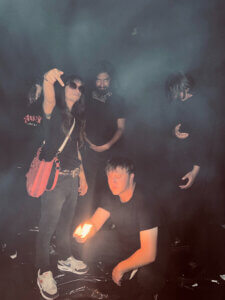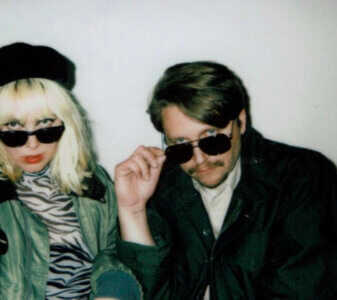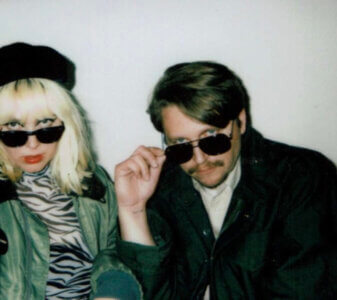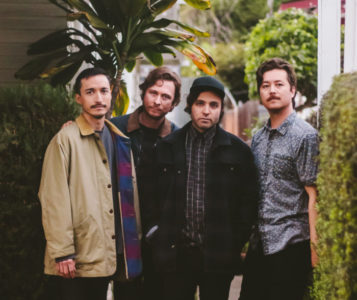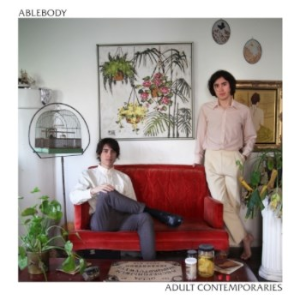Our interview with DTCV
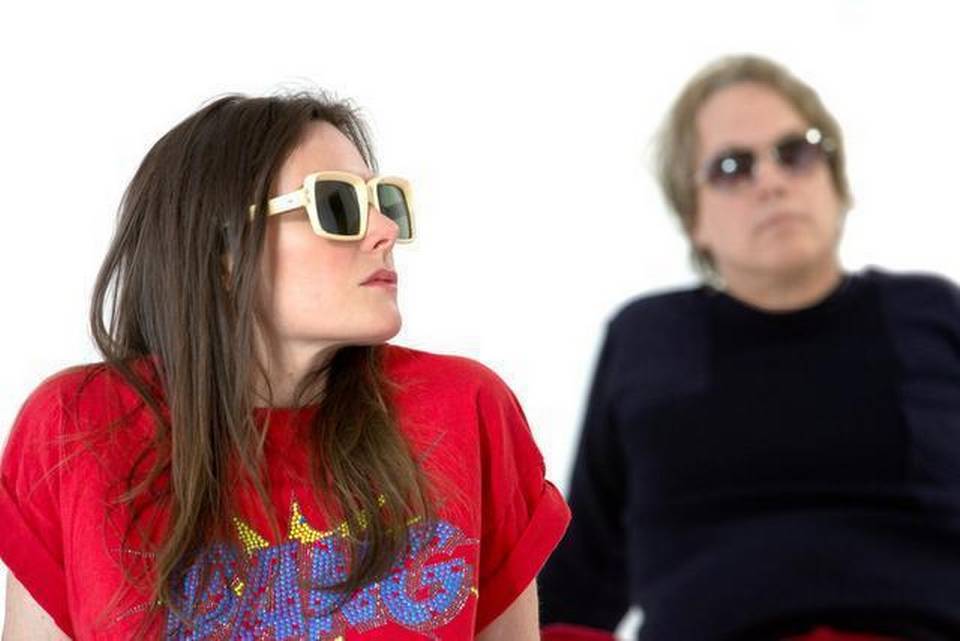
Renaissance man and musician meets French philosopher and musician. Together, they form a bande à part – a band of outsiders. Fitting, really, as they borrowed their name from one of Godard’s lesser appreciated films, Detective. Together, through his love of crunching garage guitar and her starlit vocals and stylings, DTCV produce a gently ironic blend of Velvet Underground meets Blondie via grunge. They record under pseudonyms – Vivarock and Fiat Lux, according to their press release. On the run? But while we know their real names, James Greer and Guylaine Vivarat, we’ll just focus on their brilliant songs, like “Early Alone”, “X-Water”, and “Miley Cyrus Wins the Race”, spontaneous pop gems forged from the heat of their post-punk transatlantic collaboration. Their newest release, Uptime, out on multi-colored vinyl and download on Unsatisfied Records and cassette on Lolipop Records, has just come out, and while you might want to keep this as the soundtrack to your own tragically misunderstood film, the music is just too good to hide away. Northern Transmissions needed the backstory. Alice Severin spoke to DTCV, Jim and Guylaine, about the good things that come out of being drunk, irony, and the lack of subtlety on the internet.
Northern Transmissions: How did you meet?
G – I was working for a French festival that Jim attended. We didn’t start writing songs until later, and it kind of happened randomly. I wanted to start a band, and he was asked to play a show and we started a band just for that show and then it just kind of continued.
J – I hadn’t played live since I quit Guided By Voices, and I hadn’t really planned to. But I was really drunk. That’s how most of these stories start. So I was really drunk, and some guy said ‘will you play this show?’ and I said yes, and I didn’t think about it, that there’s no band. And Guylaine wanted to start her own band, she’d been playing in a band, but wanted to start her own. And so when I said I wanted to play this show, but I don’t have a band, she said, ‘well, let’s start a band!’ At the time, we thought it was going to be just for that one show, but then I remembered how much fun it was to play live, and the music really worked out. She was writing, and the music that I was writing, worked well together, so we just kept going. So it’s been like two years now. So far it’s still fun.
G: Three years.
NT: Why are you using pseudonyms, and can we reveal your real names?
J – There are two reasons behind the pseudonyms. One, Guylaine’s name, particularly her last name, is impossible for Americans to pronounce.
G – The first name as well!
J – Yes. (laughs) And then, I’m trying to avoid, the baggage of having been in Guided By Voices. It’s not baggage, in a bad way, but we don’t sound anything like them. As much as I love all those guys, and I’m still friends with Bob, it’s misleading when it’s always like ex-Guided By Voices, it’s not what we sound like, it’s not what we’re about. And plus, we just like pseudonyms.
NT: Pseudonyms are good, I’m a big fan. I’m assuming that Vivarock is close to Vivarat.
G: Yeah. It was a nickname that my former band that I was playing in, they just gave me that nickname because they couldn’t pronounce my last name, and they were like, Guylaine rocks! And her last name sounds like Vivarock, so they just started calling me that and I always liked it, so.
J: Sometimes it’s easier to just pronounce things in a different way, because otherwise you can get into a really long conversation about how do you spell that, like if you’re checking into a hotel or renting a car. (laughs)
G: I found out much later, like musicians at parties, they would just tell me, ‘I never talked to you because I didn’t know how to pronounce your name, and I felt really stupid.’ (laughing) Anyway.
NT: You say you grew up in a village in the Alps, so that explains the Soundcloud – “chamois des alpes” and ‘lezard de desert” description.
G: I grew up in the Alps, in a village. There’s no one English or American in my family. But usually, I don’t really sound like a typical French ex-pat, so people sometimes think I’m Swedish, even though I don’t look Swedish at all.
J: It’s strange because I know French people who have lived here for way longer than Guylaine who still have heavy French accents. Some people are able to shed their accents and some people are just not, you know?
G: Yeah. (laughs) That was my way, I’m very proud of it, I feel very Alpine, so.
J: It’s a completely different thing than growing up in Paris, where everyone thinks everyone from France is from. Parisian look down on people from the Alps.
G: Yeah – they think I’m a peasant. (laughs)
NT: I thought that was interesting though, the contrast between alpine and desert – do you think that sums the two of you up? Are you opposites in the way that you approach music?
J: In terms of…Guylaine loves the desert as well – it’s more of a nature thing. I think we feel more comfortable away from the city. And since we had lived in LA for a while, we both had, and we were both sick of it. But I still kind of have to be close to there, because I do some stuff in the film industry. So it was as far away as we could get, while still being reasonably close. But it’s not like the desert is where we want to end up forever.
G: I always wanted to live in the desert, so it was a good combination. In a weird way, it’s not that far away from the Alps – the altitude is very similar to where I grew up. It’s like 3000 feet here, and can go up to 7000.
NT: LA is a whole different thing, obviously.
J: There’s a lot of good things about LA. It gets kind of a bad rap. You know. But recently, the problem, and I hate to say it, all the NYers moving to LA.
G: And everyone else. Everyone’s moving to LA. So it used to be like a well-kept secret that LA was really cool. (laughs) But now it’s not a secret anymore, so.
J: There are aspects of LA, that particularly for musicians, have always been a very good thing. Like Echo Park, and Atwater Village. And in the east, Eagle Rock, Hancock Park, the rent’s really cheap.
G: Well, it used to be.
J: Yeah, it used to be, sorry. It’s becoming over gentrified. But yeah. If you were a musician, it was great, because rent was really cheap, and you could rehearse easily. And yeah, the weather’s nice. So, there is actually a lot more culture than anyone knew about for a long time. But they now, like all the Williamsburg people who got priced out of Williamsburg are now moving to Echo Park.
NT: So they’re moving out there.
J: Yeah, exactly. That was another reason that we moved out to the desert, to get away from all that. (laughs)
NT: I can understand that. So you’ve released this album, Uptime, and you’ve just made another track available, “Radio Drive” which is really good. This one seems a bit more hard-edged, and the vocals, as always, are really striking. How do you record, and do you think about focusing on a certain part, like guitar or vocals to begin with?
G: It varies. Usually we each write our songs and then we share them. But there’s a few that we write together. “Radio Drive” is one of those, although it’s more Jim’s song than my song, it came together in the studio.
J: Ironically, it was an idea – I have this chord progression, let’s play it as fast as we can.
G: And then we told the drummer, one of the drummers we recorded with, play this kind of beat. I don’t know. (laughs)
J: And then we had a track, and we had to figure out what vocal to put over it. We went home that night and made some stuff up.
G: I have this melody, (sings) Radio Drive. And it fit!
J: That’s not usual. But I will say on this record, we worked very very quickly. Maybe too quickly in retrospect. But you have to understand, it’s closing in on a year since we recorded this, so for us, all we can see now are the flaws. So it’s like, we’ve already decided for our next one, we really want to take our time. Before we go in the studio, we want to make sure that every part is nailed down. Whereas for Uptime, we sort of winged it. We had like three-quarters of the songs worked out, but not even completely worked out. I don’t think any of the lyrics were finished. We just wrote them in the studio. It’s a way to do things. We’re not very patient anyway.
G: We’ve done that a lot with our albums. And the one before that, took a long time to finish. And that’s why I think for Uptime, we were like, ok this one is going to be done in two weeks. Recording for a week, and then mixing for a week, and then that’s it. And that’s what we did.
NT: That is quick. It used to be more like that, but now people seem to spend months and months reworking things. Do you work on the production too, then?
J: Yeah, we produce it, essentially.
G: There’s no producer.
J: But that’s because there’s really not much production. I mean, we work, basically the drum sound is what it is. The drummers that we use tend to be really hard hitters. And Guylaine is very picky about the bass sound. We’ve made a deliberate decision to use fewer keyboards on this one – there’s almost no keyboards, in fact. Because our last album was a double album, and stylistically it was all over the place, not in a bad way, it was just ambitious. But there were ten minute bass rock songs, pop songs, there was a piano ballad in French. And we thought for this one we’d just strip it down and make it more coherent.
G: More poppy, I guess.
J: Straightforward. Pop songs, or our version of pop songs, anyway.
NT: A lot of the songs have that interesting contrast between almost a 60s pop, European sound, and a rock edge, like you said, hard-hitting drums. And the contrast is so effective.
G: Thank you. That’s what I like.
J: It’s a combination of Guylaine’s influences and songwriting and my limitations as a guitarist. (Guylaine starts laughing here) I’m going to play rock guitar, there aren’t going to be any jazz chords, you know.
G: Well, we wouldn’t want to have jazz. As much as I love jazz, it would be a totally different thing.
J: It’s like, I don’t want to be too self-deprecating, I like just sort of solid rock chords, that drive the song.
G: Yeah.
J: We may well in the future do stuff that’s a little more sparse, or sparing, or complex. We certainly could. It’s just that’s what seemed to fit the songs that she was writing. Guylaine wrote most of the songs on this album. Like “Radio Drive” and “X-Water” were ones that we wrote together. The guitar parts, I played what seemed to fit. And I also played what she told me to play. (Guylaine is laughing) As a rule, she doesn’t tend to like it when I mess around with other types of parts. Just play the chords.
G: It depends. I’m not sure if I like to write songs that are not as poppy, I just can’t seem to do it. I’ve tried. (laughs) There’s always a pop melody in there, and it kind of depresses me a little bit, but that’s just how it is.
J: The irony is that I listen to a lot more pop music, and Guylaine listens to much heavier music.
G: But I can’t seem to write that. It’s just interesting.
J: She likes Black Sabbath. I think she would rather be in Black Sabbath.
G: I would definitely rather be in Black Sabbath, but unfortunately, that’s been done. (laughing)
NT: It shows you, that the creative process, you wind up looking for things, but what you find is not necessarily what you started out looking for.
G: Yeah. We’re not one of those bands. I know some bands that do that – like this album ‘is going to be a mix of indie this and specific bands’ and they try to replicate that, like a conscious process. We’re not like that at all. Whatever comes out.
J: I feel like a lot of what is called indie rock today is basically archaeology. (they both laugh) Really scrupulously authentic reproductions of stuff that’s already been done. And that’s just not what we… We could do that. It’s not that hard, let’s put it that way, first of all.
G: Vintage instruments. We have those.
J: And I’m vintage myself. (they are laughing) I know how those records were made because I was there. But we’re just not interested in doing that. We’d much rather see what comes out. I don’t understand, and this is just me, or whatever, but I don’t understand what the point of that is, of reproducing something that’s already been done.
G: Especially as painfully as some bands do it. They try to get that exact sound, and they’ll spend months in the studio trying to do that.
J: With technology today, you can do that. It’s not hard, because you can reproduce anything.
G: It’s like there’s a pedal that makes you sound like Jimi Hendrix.
NT: That’s really funny, what you’ve said about archeology, because you hear some bands, and they say they’re influenced by this or that, but they sort of act as though they are digging something up from the pyramids. Except, wait a minute, this really wasn’t that long ago. But they have this approach, like no one’s ever heard this before.
G and J: Yeah. (laughing)
J: That’s a generational thing, too. Like every 12 year old that hears The Who for the first time, thinks they’re hearing The Who for the first time. It’s like they think they’ve made a discovery. And that’s good. That’s the great thing about, it’s unusual. I think when I was growing up, you were always trying to destroy the thing that came before you. And that was what punk rock was all about. Let’s explode this corporate rock beast, let’s destroy it, and build something new and different. That process kept perpetuating for a while, and somewhere down the line, it sort of ossified, and it became like everything’s great. (laughs) Everything’s good, everything’s cool.
G: What’s that song? Everything’s Awesome? (laughs)
J: The Lego Song. I mean, like it’s great that there’s all this access to all these types of formerly difficult to find types of music. Like in the 90s if you had heard of Can, or Krautrock in general, or anything beyond that, it was like you were part of this underground secret society. Because those records were impossible to find, even after they were reissued on CD, they were really hard to find. But now in the internet age, you can find anything.
G: They’re on Spotify!
J: There’s nothing you can’t find. It just changes the way people relate to older music, in ways that are both good and bad. But there’s one thing that we are against is nostalgia, I think.
G: Yeah. A lot of bands don’t want to be on Spotify, and they’ll release cassettes and those hard to find limited editions. That’s missing, and maybe that’s why some bands are doing it that way.
J: Physical artifacts, I guess. When we first heard about it, I thought, cassettes, really? The worst medium ever invented is now coming back? But now we put our albums out on cassettes.
G: I love cassettes.
NT: I wanted to ask you about that. You released your album on cassette.
J: Yeah, there’s two labels here in LA, and one of them basically invented the cassette revival, which is Burger Records. They put out our first couple of records on cassette. But now there’s a new label called Lolipop, basically following the Burger aesthetic. They wanted to put out the new one cassette, so we said sure. Again, it’s not…you don’t make money on that. It’s not about money. If you’re making music these days to make money, you’re in the wrong business. We’re interested in cool physical artifacts that are special. And this is one of Guylaine’s special preoccupations, but CDs are just so horrible for the environment.
G: They’re just bad all around.
J: So we don’t want to do CDs anymore, because it just ends up in a landfill somewhere, for 100,000 years. It’s not like records are better, but they’re more likely to be, they last forever.
G: And you can recycle vinyl. And I found this out recently, when you have your vinyl pressed you can ask for recycled vinyl. Not to give ourselves a conscience, or something, but I do think it’s something that people should think of, you know.
NT: That’s an interesting point. Maybe that is why people are getting back into vinyl, the idea of artefacts. There’s something that’s disposable about CDs anyway, although they were supposed to be things that would last forever. But the quality deteriorates as well.
G: That was a good marketing ploy.
J: They sold it. At the time, there were a few voices, who knew what they were talking about, who were saying these things are going to start corrupting after five years. They’re going to be unplayable in ten. There’s going to be something else to replace it. But they didn’t realize that something else was going to be MP3s, which is…I mean, it’s better for the environment, I suppose. But musically, they’re just the worst possible format.
NT: I was reading someone who’s been producing, and been a musician for a long time, and he said that there’s all this technology, but the actual sound of things is deteriorating. People just turn up the levels, flatten everything out.
J: Yeah, the loudness wars. That’s…
G:…oppression.
J: That’s what’s horrifying, because an MP3, you’re getting one-tenth of the musical information that you were even getting from a CD. But you can’t fight that war. I mean, we lost that war. It’s just the way people listen to music. Streaming is even worse than that. Spotify. And I listen to music that way. It’s not like I’m some kind of a purist. If someone tells me about a band, the first thing I do is look it up on Spotify or YouTube. Because I’m cheap (they both start laughing). And also it’s so easy. I guess that’s kind of hypocritical. But the way we look at it, when we put out an album, the online version, as far as we’re concerned, if we had control over it, which we don’t always, all the online versions would be free. And then we can sell the physical artifacts, the vinyl and the cassette. Because there are people that want that.
G: Yeah, that’s what I would like. Because when a label releases it, usually they’re against that, obviously.
J: It just feels like that format of music is so ephemeral anyway; it might as well be free. I’d rather just have people listening to music, and if they really are into it, that kind of a band, then they’ll go and buy the record, in the physical format. The way the good lord intended it. (they both laugh)
NT: Then you’ve got something to hold on to. Lyrics. Pictures.
J: Yeah. I mean, every band, almost every band anyway, they put some effort into the artwork. They want people to see it, you know? It means something, to us, anyway. Again, I don’t want to get involved in the nostalgia trap – oh wasn’t it cool when you had your gatefold record, you know?
G: But also, it used to be that you would make tapes for your friends and including the artwork. It’s basically exchanging a playlist on Spotify. So it’s not like it’s a new thing either. But at some point, I would think that if you really like the band, you would actually purchase the vinyl. (they are laughing)
J: Or we’ll give it to you! If you want it that bad. (laughing) If we’re on tour, and there’s a merch table while we’re playing, there’s lots on the merch table, you could just steal the record if you want it that bad.
G: That might have happened at some point too.
J: We don’t keep track.
G: If someone going to want it so bad they’re going to steal it, I feel sort of flattered. Because that means they really want it.
NT: In all the song titles there’s a certain wry sense of humor. Like the Miley Cyrus song. I’ve listened to it a couple of times, but no mention of Miley Cyrus. And “Rock and Roll Hall of Fame Induction Song”.
G and J: (laughing) Yeah, yeah, yeah.
J: It’s more of a prediction than a song, actually.
G: A review of one of our very first EPs said we didn’t have much of a sense of humor, but I think they misunderstood, because all our titles are usually, as you would say in French, “second dégré”.
J: Irony.
G: Not to be taken literally.
J: There is no way to translate that, but generally it’s taken to mean irony.
NT: It’s the level underneath.
G: That there are other layers of meaning. You can keep going with the degrees.
J: Something that we might call meta.
G: Yeah. Different layers of meaning.
J: Particularly when we write, like a song like “Rock and Roll Hall of Fame Induction Song” – that was a title that was a joke between us. It didn’t matter which song we were going to play next, that was the name of the song. Because it’s funny. We’re not trying to hide the fact that we have some degree of education, I mean Guylaine went to the Sorbonne, and I write novels and screenplays. And also, hers comes naturally, mine just comes by virtue of being…uh, I don’t know, pretentious. (G is laughing) So a lot of our references are enigmatic, not a lot of them, but some of them. I mean the band’s name itself was originally a Godard film.
NT: Yes, why that film in particular?
G: Because it was one of the lesser known of his films, and also one that if you talked to the film experts, who know a lot of things, they will tell you that it’s his worst film or it’s not even worth watching. And also one of the actors is this French singer called Johnny Halliday. So for all those reasons, I thought if you’re going to have a Godard reference, you’re going to sound pedantic unless you pick one of those films that, you know…
J: That everyone hates, and that no one’s heard of.
G: And also it’s got a cheesy French singer in it, so, you know.
NT: Johnny Halliday is like…
J: Yeah, he’s like the French Elvis, except he’s way worse than Elvis. (G starts laughing)
NT: He’s kind of incredible, still on the Harley, still wearing leather.
J and G: He’s indestructible.
G: I think they’ve redone his face, and every single part of his body, but he still stands.
J: He’s made out of plastic, plastic and metal.
G: But like you said, he still rides his Harley. But that’s where the name comes from.
J: The internet, as you know, is not kind to accent marks, so we decided to strip it away, to abbreviate it in a way that made no sense.
G: Because also there’s a rock band in the 70s called Detective. But even with accents on the e’s, that didn’t really work.
J: Too subtle a difference for the internet. So we just decided we would abbreviate, tell everyone it stands for detective, very abstract.
G: Confused the hell out of people, though. Should I say ‘D-T-C-V, or?’ (laughs)
J: These are various strategies we’ve had to sabotage any chance of success that we might have. I think so far it’s worked pretty well. (G is laughing)
NT: And what has been an influence on you?
J: I think that was the last time there was an exciting time in rock music, in the early 2000’s in New York City with Yeah Yeah Yeahs and the Strokes. I feel like there’s been a lot of treading water since then in the indie rock world. I mean obviously there are people putting out great albums, Ty Segall.
G: And all his offshoot projects.
J: And there are so many great bands out there now, but at the same time it’d be hard to say that they are influences. Pavement was a band, when I was in Guided By Voices, we played 20 or 30 shows with them. They were influential on a musical level, and just like, Steve, has been influential as a person. I’ve been lucky to be around people who are really, really good song writers like Steve Malkmus and others that I was able to sort of learn from, first hand. I can’t not mention him. You can’t hear that in our music at all, but absolutely watching him, write songs, you know, writing songs with him. Just all of that. That was a really great time for music, for me, and I think for music in general, the late 90s. Between when Nirvana and then when Kurt killed himself was a very fertile period. There were a lot of great bands then. Bands that are forgotten now, like Unrest was a huge influence on me, but nobody really remembers them anymore. I shouldn’t say nobody. They’re not forgotten or anything, they’re not like widely…they were just an amazing band. And they definitely have an influence on how I play guitar.
G: The albums that left a really big impression on me growing up, we don’t really sound anything like that. Like Joni Mitchell would be one, I remember listening to Blue for the first time, but I don’t write songs like that, and I don’t sound like her. And the same thing with Neil Young, or people like that.
J: Or Madonna.
G: Or Madonna. (laughs) I love early Madonna, actually. I wouldn’t claim that as an influence, though. It’s kind of strange.
J: We’re in an kind of interesting…because not only is Guylaine French, and I’m American, but she’s a lot younger than I am, so just her general pop culture influences are skewed both by that she grew up in a different decade and in a different country.
G: There was no culture growing up in my village. There was no cool radio to listen to, there was no way to have access. At school, people would give you tapes and stuff like that, but it’s not…if you grew up in Los Angeles, you were exposed to a bunch of cool bands, you could go to shows and stuff like that, I didn’t have that. I have friends that grew up in LA and they went to shows when they were like 14. They saw really cool bands. I grew up listening to French music, which everyone knows is terrible. (laughs)
J: We found this band from the 90s¸ Guylaine liked them back then, they had this great pop song that we’re going to cover when we go into the studio in July. I had never heard of them – Autour de Lucie – they were an indie rock band in France in the 90s. Who knew? But they had this one really great pop song, so we’re going to do that.
NT: Are you going to record a new album? Are you thinking about the next one?
G: We are. But first we’re going to do a few songs this summer for a free EP.
J: The plan is, we’re going to re-record the song “It’s a Stealer” from Uptime, sort of put that out as a single, because we are going to tour in September. Because Guylaine didn’t like the way that ended up. We’ll do the French cover, and probably two or three new songs. Just because the guy that we’re recording with, we like the things that he’s done, the people that he’s recorded, the stuff that we’ve heard, so it’s sort of like, if this turns out really well, we probably will record our next record with him. But that probably won’t happen until later in the year, because like Guylaine said, we want to take more time with this one, and make sure the songs are completely written before we go in. (laughs)
NT: And five albums that you that inspire you.
Pink Flag – Wire
Hunky Dory – David Bowie
Loaded – Velvet Underground
Bad Moon Rising – Sonic Youth
Is This It – The Strokes
Alice Severin
Latest Reviews
Tracks
Advertisement
Looking for something new to listen to?
Sign up to our all-new newsletter for top-notch reviews, news, videos and playlists.





